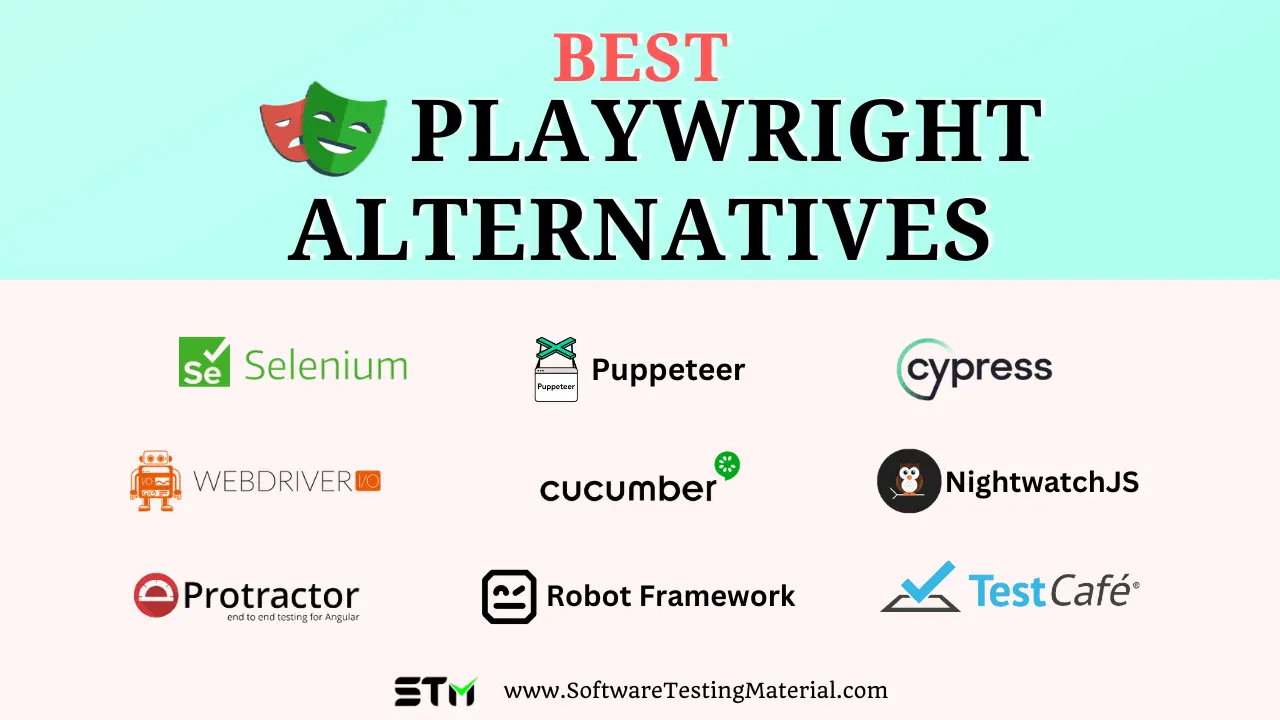9 Best Playwright Alternatives & Competitors
Are you looking for the best Playwright alternatives? If so, you’ve come to the right place!
If you are part of a software testing or development team, then you know that choosing the right tools and techniques to automate tests is essential for your success.
While Playwright has become increasingly popular amongst developers as a reliable script automation tool, there are many best alternatives to Playwright out there that offer their own unique advantages.

In this blog post, we’ll look at some of the best Playwright competitors and alternatives and provide an in-depth comparison of each one in order to help you select the best option for your needs.
What is Playwright?
Playwright is an open-source tool for browser automation initially developed by Microsoft contributors.
Playwright is actually quite similar to Puppeteer, which is also a Node.js library. Puppeteer, in case you’re not familiar, is a headless testing framework for Chrome/Chromium.
But here’s the interesting part: Playwright has a slight edge when it comes to certain functionalities. It offers support for cross-platform, cross-browser, and cross-language, and includes helpful features like auto-waiting.
Some features:
- Playwright supports all modern rendering engines, including Chromium (Chrome, Edge), WebKit (Safari), and Firefox.
- Playwright API supports programming languages such as TypeScript, JavaScript, Python, .NET, and Java.
- It supports platforms such as Windows, Linux, and macOS, locally or on CI, headless, or headed.
Comparison Best Playwright Competitors
| Name | Application Under Test | Learning curve | Ease of use | Cloud-based | Low-code support | Language support | Cross-platform | Cross-browser support | Product support |
|---|---|---|---|---|---|---|---|---|---|
| Selenium | Web | High | Requires strong coding skills | No | No | Java, JavaScript, Python, .NET, Ruby, PHP, Perl, C# | Yes | Yes | Community |
| Puppeteer | Web | High | Requires strong coding skills | No | No | Node.js | Yes | Yes | Community |
| Cypress | Web | High | Requires strong coding skills | No | No | JavaScript | Yes | Yes | Community |
| WebdriverIO | Web | High | Requires strong coding skills | No | No | Mocha, Jasmine, and Cucumber.js | Yes | Yes | Community |
Best Competitors to Playwright
#1. Selenium

Selenium is a widely used open-source web automation framework. It allows users to automate various actions on web pages, such as clicking elements, submitting forms, extracting data from websites, and more. Selenium provides a comprehensive set of features for both developers and testers alike.
One of the most useful features of Selenium is its ability to locate elements on web pages. This makes it possible to perform various actions on those elements, such as clicking them or entering text into them.
Selenium also supports custom commands for more complex tasks, such as executing JavaScript code.
Selenium is also highly extensible, allowing users to write their own scripts and extensions using the language of their choice.
With its wide range of features and capabilities, Selenium can be used to automate virtually any web-related task.
Selenium has become the go-to tool for many developers and testers due to its ease of use and flexibility.
Its robust feature set and extensibility make it an ideal choice for automation tasks, and its extensive documentation makes it easy to get started.
Whether you’re an experienced web developer or a beginner just starting out, Selenium has something to offer everyone.
Overall, Selenium is an immensely useful tool that can help automate many of the mundane tasks associated with web development and testing.
#2. Puppeteer

Puppeteer is a Node library that provides a high-level API to control Chrome or Chromium over the DevTools Protocol.
As current versions of Chrome have software restrictions that make it difficult to run headlessly, Puppeteer can be used to work around these limitations and allow automated testing, web scraping, and other activities in real-time.
Using Puppeteer, developers can write scripts to interact with a web page and perform actions such as clicking on links, filling out forms, taking screenshots, and more.
The library also provides the ability to create custom functions for specific tasks. For example, a function could be written to automate the process of logging into a website or performing any other action that requires user input.
Additionally, Puppeteer supports headless Chrome and is the recommended library for running automated tests on websites and web applications.
With its powerful API, Puppeteer makes it easy to create high-quality automated tests that are both reliable and repeatable.
The library can also be used to automate mundane tasks, such as filling out forms and taking screenshots for use in documentation or reporting.
Finally, the library provides a wealth of flexibility, allowing developers to tailor their scripts to fit their individual needs.
#3. Cypress

Cypress is a powerful JavaScript-based testing framework designed to make end-to-end testing of web applications faster and more reliable.
It is based on the popular Mocha test framework and uses an intuitive API that allows developers to quickly write tests for their applications.
Cypress also includes built-in features such as automatic waiting, network traffic control, mocking and stubbing, and code coverage.
Cypress enables developers to create automated tests with very little effort. It has become an essential tool in the modern software development process, ensuring that applications are reliable and perform as expected.
With its robust capabilities and ease of use, Cypress is helping organizations build more resilient web applications faster than ever before.
Cypress is also designed for continuous integration and deployment (CI/CD), with support for popular CI/CD tools such as Jenkins, Travis, CircleCI, and more.
In addition, Cypress uses its own cloud-based dashboard to give developers access to test results from any environment at any time. This allows teams to quickly detect issues and make necessary changes without manual intervention or costly delays.
By automating end-to-end testing with Cypress, teams can quickly identify and fix errors while ensuring that their applications meet the highest quality standards.
With the help of Cypress, developers can create reliable, resilient web applications faster than ever before.
As a result, they are able to deliver better experiences for users at a fraction of the cost and time required by traditional testing methods.
Cypress is the perfect tool for organizations looking to streamline their web application development and testing process.
Furthermore, By automating end-to-end tests with Cypress, developers can focus on developing features that will delight users instead of worrying about manual testing cycles.
#4. WebdriverIO

WebdriverIO is a powerful open-source testing automation framework that enables developers to automate web applications through the use of JavaScript.
It is highly beneficial for conducting thorough tests on web applications and even native iOS mobile apps.
The framework also provides support for running tests on different browsers, as well as cloud services like Sauce Labs and BrowserStack.
Additionally, WebdriverIO features an extensible plugin system that allows developers to easily extend the framework with custom plugins.
WebdriverIO also offers detailed debugging and reporting capabilities, making it simple to troubleshoot issues with your web applications.
With its wide range of features and ease of use, WebdriverIO is a great choice for automating web applications.
With WebdriverIO, developers can quickly and easily automate web applications and ensure that they are running properly.
WebdriverIO is also highly customizable, allowing developers to tailor their tests to fit their specific needs.
WebdriverIO supports javascript/typescript languages only.
Additionally, it features a variety of commands for automating web browsers, such as clicking links, filling in forms, and taking screenshots.
With its wide range of capabilities and flexibility, WebdriverIO is a great tool for automating web applications.
Overall, WebdriverIO is a powerful and versatile framework for automating web applications.
#5. Cucumber

Cucumber is an open-source, behavior-driven development (BDD) tool that is often used to streamline test automation.
It makes writing the test easy because it’s in a natural Gherkin language format.
This makes it easy to communicate the requirement between members of a team without having to learn complex scripting languages.
Cucumber also supports multiple programming languages like Ruby, Java, JavaScript, and . NET.
Cucumber is based on the principle that software should be developed to meet the customer’s expectations by understanding their needs.
By focusing on behavior rather than implementation, Cucumber helps testers and developers to come up with better solutions quickly.
It also allows for more efficient collaboration between team members as they can share scenarios and review them together.
Cucumber can be used to test a wide range of software, from web applications and mobile apps to databases and APIs.
It also helps ensure that the code is written correctly by providing an automated way to verify the implementation of tests against the requirements.
Furthermore, Cucumber’s reporting capabilities make it easy to identify which features are not working as expected and to quickly fix any issues.
Overall, By using Cucumber, teams can easily collaborate to deliver software that meets customer expectations in an efficient and cost-effective manner.
#6. NightwatchJS

NightwatchJS is a super handy End-to-End test automation framework that does writing, running, and debugging tests across web and mobile applications.
You can use it to write automated tests in Node.js using the Selenium-based Webdriver API. With NightwatchJS, you can perform all the operations that Selenium does.
NightwatchJS also enables developers to write tests in a BDD (Behaviour Driven Development) style, meaning that tests can be written in a natural language format and be easier to maintain.
NightwatchJS is designed with scalability, robustness, and reliability in mind, making it suitable for mobile web testing, native mobile testing, and real desktop browser testing.
It provides many features such as test-retries, real-time reporting, automatic waiting commands and assertions, assertion chaining, and more.
The framework also supports parallel test execution, meaning that multiple tests can be run simultaneously in different browsers or on different machines.
NightwatchJS is an ideal tool for developers who want to write automated tests quickly and easily. With its extensive feature set, NightwatchJS allows developers to create robust, reliable automated tests with minimal effort.
Furthermore, the framework’s scalability and robustness make it suitable for large-scale projects, ensuring that tests run reliably regardless of the size or complexity of the web application.
NightwatchJS also enables developers to write Selenium tests without having to learn a new language. By using the same syntax as used in Node.js, developers can quickly become acquainted with test writing using NightwatchJS. This makes test development much faster and more efficient, meaning developers can spend less time writing tests and more time doing what they love – coding!
Overall, NightwatchJS is an effective tool for web application testing and website automation. It provides a robust feature set that enables developers to quickly create reliable automated tests while also being scalable, robust, and reliable.
#7. Protractor

Protractor is an end-to-end test framework for Angular and AngularJS applications.
It was built on top of WebDriverJS, which provides the ability to control a browser with just a few lines of code.
Protractor’s primary purpose is to automate tests that simulate user interaction with an application. By doing so, it ensures that the expected behavior occurs in all supported browsers.
Protractor is also tightly integrated with WebDriver, making it easier to manage multiple browser sessions at the same time.
Protractor supports a variety of testing features, including automated test execution across multiple browsers, the ability to run tests in parallel for increased speed and efficiency, and easy integration with Continuous Integration tools such as Jenkins.
Protractor has the capability to automatically execute the subsequent step in your test as soon as the webpage completes its pending tasks. This eliminates the concern of synchronizing your test and webpage.
Overall, it provides all the features necessary to ensure that applications behave as expected across different browsers and platforms.
#8. Robot Framework

Robot Framework is an open-source automation framework used for automating software testing and other test-related activities.
Robot Framework has a user-friendly syntax, making it easy to understand with its human-readable keywords. Plus, can extend its capabilities by using libraries implemented with Python, Java, or even other programming languages. And the best part is, Robot Framework has a whole ecosystem of libraries and tools developed as separate projects, so you have plenty of options to explore!
Furthermore, Robot Framework is highly extensible and integrates easily with other automation frameworks. This makes it possible for users to customize their tests according to their specific needs.
Robot Framework is also highly portable and can be used across various platforms, including Windows, Mac OS X, Linux, and more.
It is well-suited for distributed test execution and is capable of running both serial and parallel tests in a single test suite.
Additionally, Robot Framework provides a rich set of reporting and logging features that allow users to easily analyze the results of their tests.
#9. TestCafe

TestCafe is an open-source end-to-end testing solution that allows users to quickly and easily create tests for web applications.
It has been designed to provide developers with the tools necessary to run automated end-to-end tests on their website or application without having to write any code.
TestCafe enables developers to test across multiple browsers, including mobile devices and supports multiple programming languages (JavaScript, TypeScript, and CoffeeScript) for writing tests.
With TestCafe, developers can easily create tests that cover the full range of web interactions from basic clicks to complex form submissions.
TestCafe is awesome because it can test any application that runs in a browser! It’s not just limited to websites, it can also test mobile websites, Progressive Web Applications, and even Electron apps.
You can use TestCafe to create API tests too.
With its powerful debugging tools, intuitive UI, and robust integration with popular CI tools, TestCafe is an excellent choice for developers looking to automate their web application testing.
FAQs Best Alternatives to Playwright
Which is better Playwright or Selenium?
The choice between these two testing frameworks depends on project requirements and priorities. When dealing with complex web applications and limited coverage, Playwright is the preferred option for testing. On the other hand, if wider coverage is needed, Selenium is the optimal choice.
Which is better Playwright or Puppeteer?
Playwright is the recommended choice if you seek increased flexibility and support from third-party services. Conversely, for JavaScript users working with Chrome, Puppeteer is the recommended option.
Which is better Playwright or Cypress?
When it comes to picking a testing framework, the most important thing to consider is usage and functionality. The Playwright was originally designed for end-to-end testing, while Cypress is more suitable for unit testing. If you’re experienced and looking to test Webkit browsers or your tests cover multiple domains and pages, then Playwright is the way to go. If you’re new to this and want something that’s easy to install and use, then Cypress is the way to go.
Conclusion – Top Best Playwright Alternatives
As outlined above, Selenium, Puppeteer, Cypress, WebdriverIO, Cucumber, NightwatchJS, Protractor, Robot Framework, and TestCafe are some of the top solutions to consider when choosing the best Playwright alternatives and competitors.
Each option has its own advantages and disadvantages when compared against one another.
It is clear that there is no single, one-size-fits-all option.
All of these options can help create smooth test automation processes that guarantee fewer errors in the end product.
Depending on the type of web automation projects you are working on, your programming language preference, and/or your budget constraints, you must consider which solution will be the right fit for you.
For example, Selenium is fantastic for test teams that prefer to write in Java; Puppeteer is perfect if you’re dealing with high levels of user interaction; Cypress would be an ideal choice for Frontend React unit tests; and Robot Framework is useful if you need a generic and extensible open source automation framework.
Despite the pros and cons of each option, hopefully, this blog has provided enough information to help make a decision.
Related posts
- Selenium Alternatives
- Cypress Alternatives
- Cypress vs. Selenium – Which Is Better
- Katalon vs. Selenium – Which Is Better
- Playwright vs. Selenium – Which is Better
- Best Automation Testing Tools






